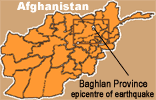In wake of devastating Afghan earthquake, UN rushes in to assess damage, bring aid
 |
The quakes – the strongest measuring 6.0 on the Richter scale – struck the northern province of Baghlan on Monday evening, with the epicentre located in the Nahrin district, about 160 kilometres north of the capital city of Kabul, according to the UN Office for the Coordination of Humanitarian Affairs (OCHA).
Initial reports from the Afghan Interim Authority estimated that there were approximately 1,800 dead, 4,000 injured and 20,000 people left without shelter. In Nahrin, nearly 100 people were reported killed and 90 per cent of the homes destroyed.
Reacting to the news, Secretary-General Kofi Annan, who was in London en route to the Arab League summit in Beirut, expressed his distress over the tragedy and asked the UN Mission in Kabul to do everything possible to help.
For his part, UN General Assembly President, Han Seung-soo of the Republic of Korea, expressed hope in a statement that the international community would act fast to bring relief assistance to the injured and to the many that have suddenly become homeless.
Meanwhile in the Security Council, Norwegian Foreign Minister Jan Petersen, who chaired this morning’s meeting on the situation in Afghanistan, conveyed the 15-member body’s deepest condolences to the Afghan authorities and people, a sentiment echoed by the numerous speakers who took part in the ensuing discussion.
In Afghanistan, Mr. Annan’s deputy envoy, Nigel Fisher, immediately convened a meeting with representatives of the interim authorities, UN agencies, non-governmental organizations and donors to help the Interim Administration deal with the tragedy.
According to the UN spokesman in Afghanistan, Manoel de Almeida e Silva, a multi-agency UN assessment team has been dispatched by road from Mazar-i-Sharif to the disaster area while a separate team was transported from Kabul by helicopters of the International Security Assistance Force (ISAF) to set up a field office and telecommunications equipment.
UN and other relief agencies had sent in several convoys of emergency supplies, including more than 2,000 tents, 1,000 blankets, food and drinking water, Mr. de Almeida e Silva added.
